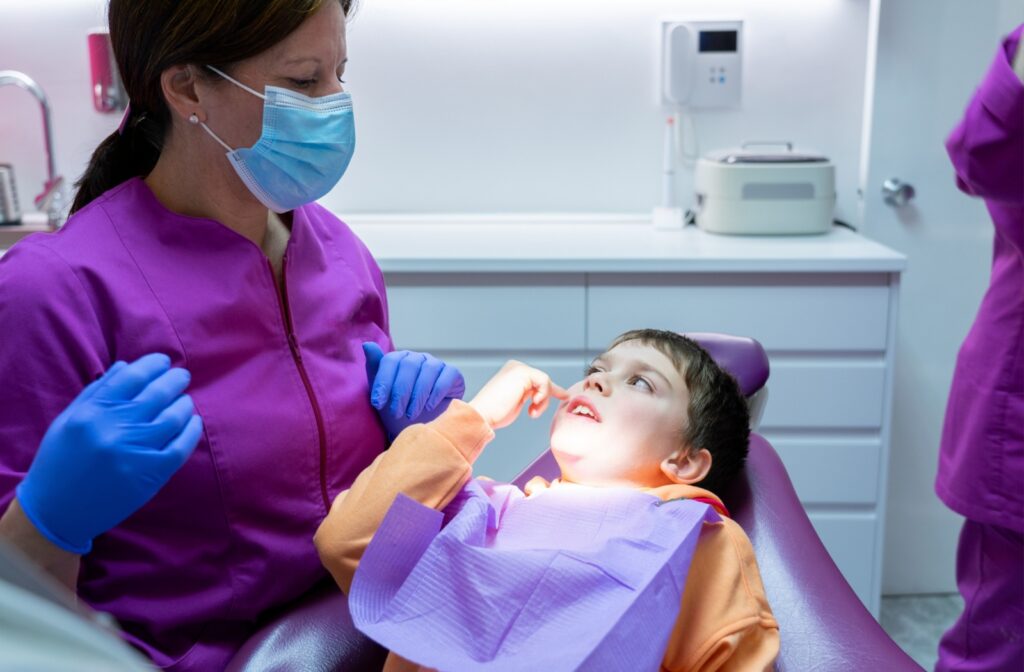For some people, the sound of a dental drill comes with a feeling of dread. Our team at False Creek Dental understands some individuals experience anxiety when visiting their dentist. However, don’t let this fear deter you from doing right by your oral health. The benefit of visiting your dentist for regular cleanings and exams is that your dental team can treat and prevent dental concerns before they become too severe.
Cavities are the most common dental concern. A fully formed cavity will not heal on its own. No amount of brushing, flossing, or at-home care will treat a cavity. It’s important to visit your dental team to identify and treat cavities to prevent significant tooth decay. If the sound of a dental drill during your filling seems overwhelming, there are new, drill-free ways to treat your cavity!
How are Cavities Formed?
A cavity is a small hole that forms on a tooth’s surface. Cavities form when sugar from food and drink mixes with the plaque in our mouths. This creates an acid that erodes the enamel of the tooth, leading to the formation of a cavity.
The enamel of your tooth is a hard protective layer that covers the tooth and is incapable of regeneration. If a cavity remains untreated, the hole in the enamel becomes bigger and affects deeper layers of your teeth. This leads to significant tooth decay.
The symptoms of a cavity can vary depending on how many cavities you have, where they’re located, and what stage of formation the cavity is at. If a cavity is in its early stages of formation, you may not experience symptoms. But as the tooth continues to decay, some symptoms can include:
- Toothache
- Tooth Sensitivity
- Pain in your jaw when you bite
- Black, brown, or white spots on the surface of your tooth – A white spot on your tooth is a sign of early decay. At this stage, decay can be stopped or reversed. The enamel can be repaired with fluoride from a special fluoride toothpaste or a special fluoride treatment by your dental team.
- A visible hole in your tooth
How you can Prevent Cavities
Cavities are the most common dental concern. Anyone is at risk for cavities. While cavities can’t heal themselves, we can reduce our risk of cavities by doing the following:
- Consuming less sugary and acidic food and drink
- Brushing teeth twice a day and flossing once a day
- Using a fluoride toothpaste.
- Visiting your dentist for regular cleanings and exams to help treat and prevent any future dental concerns early.
Treatment Options Available for Cavities
If you are experiencing any symptoms of a cavity, don’t worry! We can help with treatment. The sooner you seek care, the better your chances of treating tooth decay at the earliest stage. Treatment options for cavities depend on how advanced the tooth decay is. At False Creek Dental, we offer both alternative and traditional methods of cavity treatment:
- Silver Diamine Flouride (SDF) treatment
- Solea Laser
- Fillings
- Crowns
- Root canals
- Tooth extractions
Silver Diamine Fluoride (SDF) Treatment for Cavities
SDF is a topical drug used to treat and prevent cavities and hypersensitivity in teeth. The procedure is painless and doesn’t require a dental drill, needles, or local anesthetic.
SDF treatment works best on baby teeth because a side effect of SDF is discoloration on the decayed tooth. The decayed spots on the tooth will stain black once the treatment is applied and take about a week to appear. These black stains on the tooth are permanent. If SDF treatment is applied to baby teeth, staining is not usually a concern since the child’s permanent tooth will grow in. Alternatively, if esthetics are a concern, the discoloration can be covered with a white filling.
Solea Laser Treatment for Cavities
Solea is a dental laser tool used to treat a variety of dental concerns, one of which is cavities. Solea laser is a great alternative to a traditional drilling. The procedure is quick, drill-free, and usually needle-free, which means it eliminates the need for a local anesthetic. Which means you don’t have to spend the rest of your day with a numb mouth, and can get right back to the rhythm of life.
The Solea Laser can remove tooth decay, cut enamel, and shape soft tissue and bone without painful drilling. This treatment is safe for children and doesn’t leave the tooth discoloured. Using a computer controlled CO2 laser allows the system to be fast, precise, and painless.
Come & Visit your Dentist!
It’s recommended to brush your teeth twice a day and floss once a day to help keep cavities and other dental concerns at bay. But you may be unaware that a cavity is forming! Even if you are consistent with your at-home dental care, we still suggest coming in for regular cleanings and exams every 6-months.
Speak to your dental team about which treatment options will be the best fit for your dental concerns. At False Creek Dental Centre, we work hard to provide a safe, welcoming, and judgement-free environment to help our patients maintain beautiful, healthy smiles.



